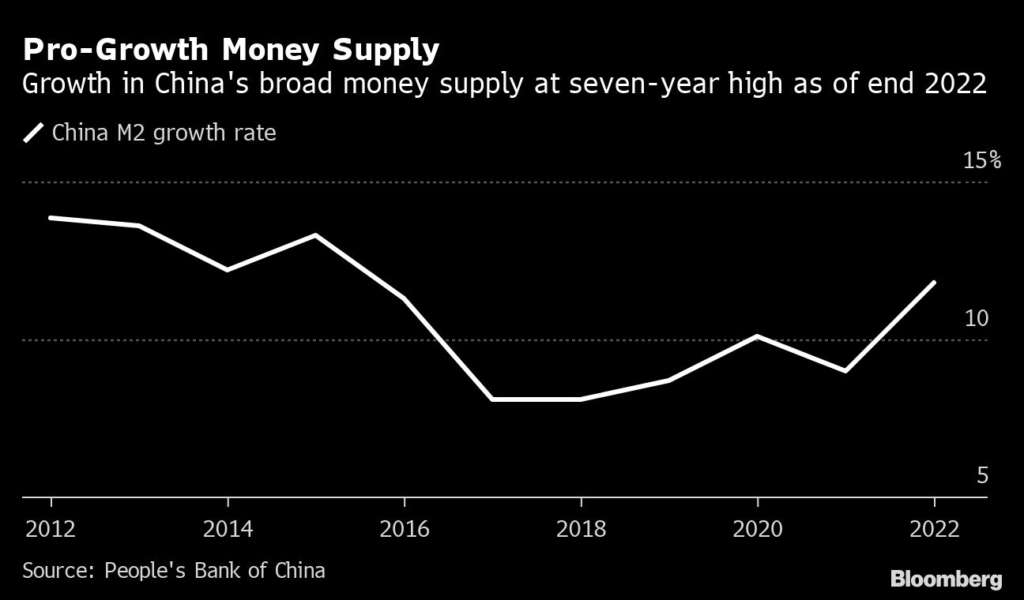China will avoid unleashing massive monetary stimulus into the economy this year as it seeks to strike a balance between boosting growth, creating jobs and maintaining price stability, a central bank deputy governor said Friday.
(Bloomberg) — China will avoid unleashing massive monetary stimulus into the economy this year as it seeks to strike a balance between boosting growth, creating jobs and maintaining price stability, a central bank deputy governor said Friday.
“We will ensure overall social demand gets powerful support. Meanwhile, the magnitude will be reasonable and appropriate and we will avoid flooding the economy with liquidity,” said Deputy Governor Xuan Changneng at a press conference. He repeated the People’s Bank of China’s long-standing stance that cash supply will stay “reasonably sufficient.”
The PBOC will guide banks to “appropriately handle the strength and pace of credit supply, properly front-load support, and actively and closely coordinate with the fiscal policy and social policies,” Xuan said.
The world’s second-largest economy is trying to mount a recovery this year after hastily abandoning its Covid Zero strategy toward the end of last year, allowing the virus to spread throughout the nation. Economists expect gross domestic product growth to pick up to 4.8% in 2023 after likely having grown just 3% last year. Activity was hampered last year by strict movement curbs and lockdowns, along with a mounting property crisis.
To aid the recovery, economists see the PBOC keeping monetary policy loose for at least the next few months. Prior to Friday’s press conference, officials had said that monetary stimulus this year would be at least as strong as in 2022, with policies focused on supporting domestic demand.
While inflation soared in many developed countries last year, prices have remained subdued in China, with consumer inflation rising 2% in 2022, below Beijing’s target of around 3%.
Zou Lan, head of the PBOC’s monetary policy department, said at the Friday briefing that the PBOC’s prudent policy “created a good monetary environment” for the soft price increases.
While inflation is expected to stay “mild” this year, Zou warned of risks of a rebound in prices due to the likely “lagged” impact from China’s fast money supply growth, the unleashing of pent-up consumption demand now that Covid curbs are lifted, and imported inflation.
“There is still uncertainty in price trends. We must not let our guard down and should keep a close eye on potential rises in inflation in the future,” he said.
Separately, authorities are studying additional structural tools to help stabilize the real estate market, Zou said. That would include arrangements to support the delivery of housing projects, along with loans for rental housing and bond financing for private firms, he added.
China’s structural loan programs amounted to around 6.4 trillion yuan as of the end of last year, and are currently focused on lending to small firms and sectors in low-carbon development and technology innovation, Zou said. That compares with 214 trillion yuan in total yuan loans outstanding, according to PBOC data.
The government in recent months has been ramping up favorable policies to help the ailing property market recover from its historical slump. Authorities are drafting an “action plan” to improve the balance sheet of quality developers with measures such as extending debt and providing more equity financing for the firms.
Zou said at the briefing the government doesn’t have a name list of developers eligible for the aid, and that it will let financial institutions make their own decisions about providing funding.
The Chinese currency, meanwhile, had a strong start to 2023 on the back of optimism on China’s economy after the Covid controls were dropped, and as the US Federal Reserve slowed the pace of its rate hikes. Xuan said there is “firm foundation” for the yuan to stay “basically stable” going forward, citing factors such as the economy’s recovery, even though the growth in trade surplus may decelerate.
(Updates with more details throughout.)
More stories like this are available on bloomberg.com
©2023 Bloomberg L.P.










